-
Sweden will expel 80,000 refugees whose asylum applications were denied
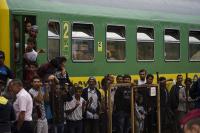
Sweden’s interior minister Anders Ygeman said on Wednesday that Sweden plans to expel up to 80,000 asylum seekers who entered the country in 2015 and whose applications had been rejected. Ygeman noted that normally expulsions are carried out using commercial flights, but in light of the large numbers involved, specially chartered aircraft would be used – and the process would take a few years.
-
-
U.S. undocumented population declines
In a just-released report, the Center for Migration Studies of New York (CMS) finds that the U.S. undocumented population has fallen below eleven million for the first time since 2004. The report also offers evidence that the Mexican-born undocumented population continues to decline, falling by more than 600,000 since 2010. The study further describes trends in the undocumented population over the past few years for selected countries of origin and states of residence.
-
-
Greece to be expelled from Schengen free travel zone agreement
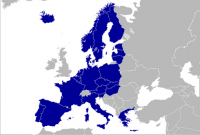
Greece is likely to be expelled or suspended from the Schengen free movement zone as European leaders appear to have concluded that the Greek government does not have to will, or the ability, to control the country’s borders. EU have been pressuring Greece for months to stem the flow of refugees from Turkey into Greece – and from Greece to other EU countries – but to no avail.
-
-
Migration crisis might destroy Europe: French PM Manuel Valls
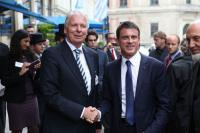
Europe cannot take in all the refugees fleeing war-torn Syria and Iraq and the migration crisis is putting the European Union in grave danger, the French Prime Minister Manuel Valls has said. Valls, speaking at the World Economic Forum in Davos, said that “The concept of Europe that our founding fathers had…is in very grave danger,” and that Europe needed to take urgent action to control its external borders. “Otherwise,” he said, “our societies will be totally destabilized.”
-
-
Europe’s failed response to refugee crisis risks fraying local labor markets
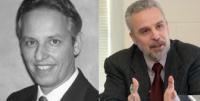
As this crisis continues to unfold and countries in Europe reevaluate how to manage its challenges, it is essential that we take time to appreciate the broader context of the problem and some of the issues that have been neglected, specifically the negative effects on labor markets. While the plight of the refugees is desperate, the consequences of the crisis are also dire for some of the most significant achievements of European integration: open borders, social welfare, and human rights. They have also affected the functioning of European labor markets in ways that have been poorly understood. Understanding these effects is important because welfare, peace, human rights, and open borders all depend on the capacity of governments to generate wealth through work and production.
-
-
1 percent of visitors to U.S. over-stayed past 2015 exit dates

DHS said that about 1 percent of visitors who arrived in the country by air or sea remained in the country last year after they were supposed to leave. DHS release data on Tuesday which show that about 45 million of those visitors were due to leave at some point in the year ending 30 September, and that DHS could confirm that all but 416,500 had exited the country. Another 66,500 people stayed past their leave date, but later left the United States.
-
-
Immigrants play growing role in U.S. science and engineering (S&E) workforce
Immigration is a significant factor in decade-long growth in total science and engineering (S&E) workforce. From 2003 to 2013, the number of scientists and engineers residing in the United States rose from 21.6 million to 29 million. This 10-year increase included significant growth in the number of immigrant scientists and engineers, from 3.4 million to 5.2 million. Immigrants went from making up 16 percent of the science and engineering workforce to 18 percent.
-
-
Canada avoids sex attacks by accepting refugee families over single men
Canada’s immigration minister John McCallum said Canada will not suffer from Cologne-style sex attacks because the country “carefully selects” the Syrian refugees it takes in. McCallum said that because Canada has welcomed Syrian refugees “with open hearts and love,” Canadians will not be affected by their resettlement as Germany has been. “Most of them are not single men. Most of them are family members. Whereas Germany accepts everybody that comes to its borders,” McCallum said.
-
-
Czech president says integrating Muslims into Europe is “impossible”
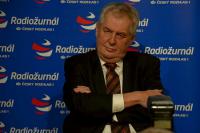
Czech president Milos Zeman, who gained a name for his ardent anti-immigration stance, asserted on Sunday that it was “practically impossible” to integrate the Muslim community into European society. Zeman last week claimed that the influx of migrants into Europe was orchestrated by Egypt’s Muslim Brotherhood, and that he Islamist group was receiving money from several states to finance a Muslim effort to “gradually control Europe.”
-
-
New regulations improve opportunities for certain highly skilled workers

DHS’ U.S. Citizenship and Immigration Services on Friday announced changes to the programs serving the H-1B1, E-3, and CW-1 nonimmigrant classifications, and the EB-1 immigrant classification. The purpose of the changes was to remove the obstacles and disadvantages workers in these categories faced compared to workers in other visa classifications.
-
-
Germany creates IDs for refugees
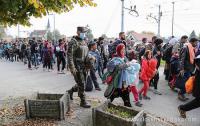
Germany’s parliament on Thursday voted for bill which would require refugees to carry a new ID card which would be linked to a centralized refugee database. The refugees will receive IDs that will include biometric information such as fingerprints, all the information required for an asylum request, country of origin, contact details, health status, and educational and professional qualifications. A centralized system will German federal and state agencies access to the information.
-
-
Switzerland to seize assets from refugees to cover upkeep costs
In a move which mirrors a policy approved by the Danish parliament earlier this week, the Swiss government announced that refugees arriving in Switzerland have begun to turn over to government agencies any assets worth more than 1,000 Swiss francs (£690). Refugees who are approved for staying and working in Switzerland have to surrender 10 percent of their pay for up to ten years until they repay 15,000 Swiss francs in costs.
-
-
Norway to send “bicycle refugees” back to Russia
In 2015, about 5,500 people, most of them refugees Syrians, cycled through the Arctic Circle Storskog crossing, on the border between Russia and Norway, taking take advantage of a loophole in the rules governing border crossing: Russia does not allow people to cross on foot and Norway does not let in drivers carrying people without documents, but bicycles are permitted at both ends. Norway said it would send these refugees back to Russia – on the bicycles if necessary.
-
-
U.K. bail procedure to be changed to prevent jihadists from leaving country while on bail
Prime Minister David Cameron has pledged to oversee a shakeup of police bail procedures after a counterterrorism chief said the procedures were “weak and “toothless” and allowed jihadists to act with impunity. The weaknesses in the current bail system were highlighted by the revelations that Siddhartha Dhar, the Londoner suspected of being Isil’s new ‘Jihadi John’, was able to leave the United Kingdom without any problem while on bail despite being told to surrender his passport. Under current law, the police are powerless to escort a released suspect home to seize their passport because of bail regulations and human rights laws.
-
-
Istanbul terrorist was a Syrian asylum seeker
Turkish media report that the terrorist who killed ten tourists in Istanbul entered the country as an asylum seeker from Syria. Most of the dead and wounded in the attack were German nationals. The Turkis police was able to identify the attacker quickly because his fingerprints were already stored in Turkey’s the refugee biometric database.
-
More headlines
The long view
Social Acceptance of Immigrants Working as Politicians or Judges Is Low
Often, the dominant society develops negative attitudes towards immigrants and their descendants because their integration is too successful – and not because they are unwilling to integrate. A possible explanation for negative attitudes towards successful immigrants could be the dominant society’s fear of immigrants occupying influential and value-based occupations. This applies, for example, for immigrants working in local politics or law.
